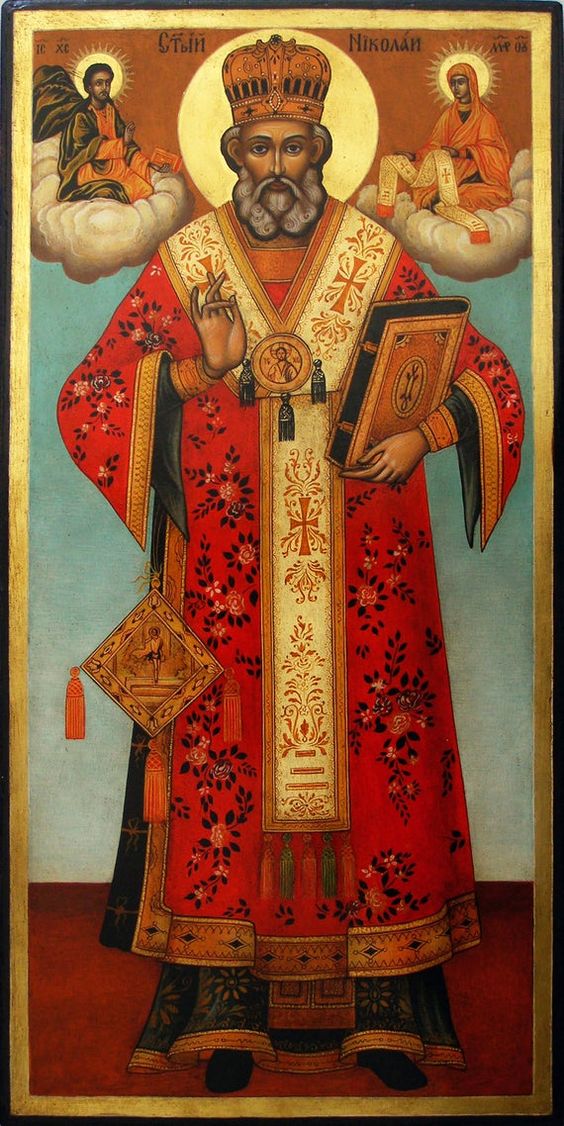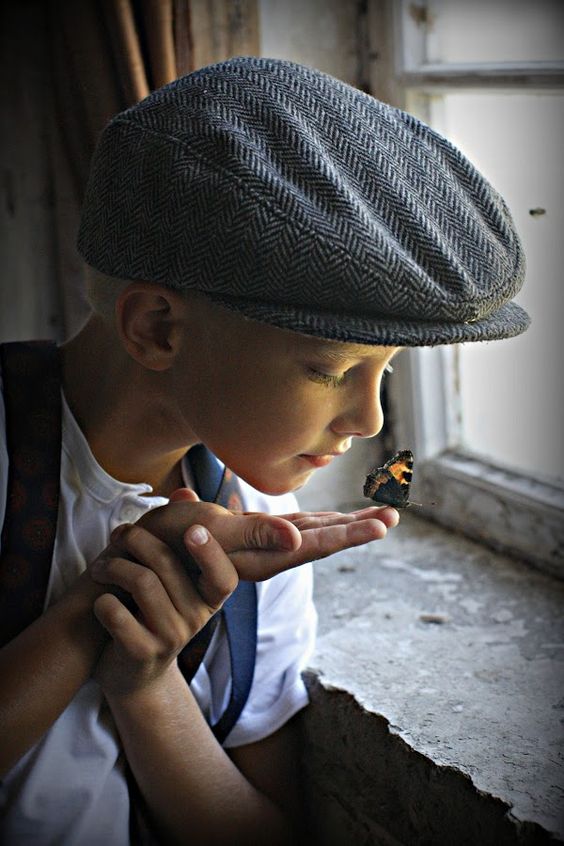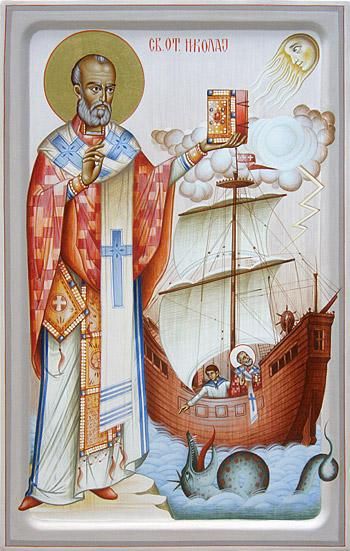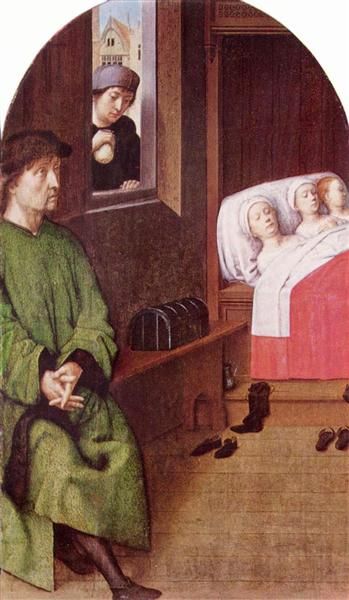
Of all the saints
that little children love is there any to compare with Santa Claus? The
very sound of his name has magic in it, and calls up visions of
well-filled stockings, with the presents we particularly want peeping
over the top, or hanging out at the side, too big to go into the largest
sock. Besides, there is something so mysterious and exciting about
Santa Claus, for no one seems to have ever seen him. But we picture him
to ourselves as an old man with a white beard, whose favourite way of
coming into our rooms is down the chimney, bringing gifts for the good
children and punishments for the bad.
Yet this Santa
Claus, in whose name the presents come to us at Christmas time, is a
very real saint, and we can learn a great deal about him, only we must
remember that his true name is Saint Nicholas. Perhaps the little
children, who used to talk of him long ago, found Saint Nicholas too
difficult to say, and so called him their dear Santa Claus. But we
learn, as we grow older, that Nicholas is his true name, and that he is a
real person who lived long years ago, far away in the East.
The father and
mother of Nicholas were noble and very rich, but what they wanted most
of all [85]was to have a son. They were Christians, so they prayed to
God for many years that he would give them their heart's desire; and
when at last Nicholas was born, they were the happiest people in the
world.
They thought there
was no one like their boy; and indeed he was wiser and better than most
children, and never gave them a moment's trouble. But alas, while he was
still a child, a terrible plague swept over the country, and his father
and mother died, leaving him quite alone.
All the great riches
which his father had possessed were left to Nicholas, and among other
things he inherited three bars of gold. These golden bars were his
greatest treasure, and he thought more of them than all the other riches
he possessed.
Now in the town
where Nicholas lived there dwelt a nobleman with three daughters. They
had once been very rich, but great misfortunes had overtaken the father,
and now they were all so poor they had scarcely enough to live upon.
At last a day came when there was not even bread enough to eat, and the daughters said to their father:
'Let us go out into the streets and beg, or do anything to get a little money, that we may not starve.'
But the father answered:
'Not to-night. I
cannot bear to think of it. Wait at least until to-morrow. Something may
happen to save my daughters from such disgrace.'
Now, just as they
were talking together, Nicholas happened to be passing, and as the
window was open he heard all that the poor father said. It seemed
terrible to think that a noble family should be so poor and actually in
want of bread, and Nicholas tried to plan how it would be possible to
help them. He knew they would be much too proud to take money from him,
so he had to think of some other way. Then he remembered his golden
bars, and that very night he took one of them and went secretly to the
nobleman's house, hoping to give the treasure without letting the father
or daughters know who brought it.
To his joy Nicholas
discovered that a little window had been left open, and by standing on
tiptoe he could just reach it. So he lifted the golden bar and slipped
it through the window, never waiting to hear what became of it, in case
any one should see him. (And now do you see the reason why the visits of
Santa Claus are so mysterious?)
Inside the house the
poor father sat sorrowfully watching, while his children slept. He
wondered if there was any hope for them anywhere, and he prayed
earnestly that heaven would send help. Suddenly something fell at his
feet, and to his amazement and joy, he found it was a bar of pure gold.
'My child,' he
cried, as he showed his eldest daughter the shining gold, 'God has heard
my prayer and has sent this from heaven. Now we shall have enough and
to spare. Call your sisters that we may rejoice together, and I will go
instantly and change this treasure.
The precious golden
bar was soon sold to a money-changer, who gave so much for it that the
family were able to live in comfort and have all that they needed. And
not only was there enough to live upon, but so much was over that the
father gave his eldest daughter a large dowry, and very soon she was
happily married.
When Nicholas saw
how much happiness his golden bar had brought to the poor nobleman, he
determined that the second daughter should have a dowry too. So he went
as before and found the little window again open, and was able to throw
in the second golden bar as he had done the first. This time the father
was dreaming happily, and did not find the treasure until he awoke in
the morning. Soon afterwards the second daughter had her dowry and was
married too.
The father now began
to think that, after all, it was not usual for golden bars to fall from
heaven, and he wondered if by any chance human hands had placed them in
his room. The more he thought of it the stranger it seemed, and he made
up his mind to keep watch every night, in case another golden bar
should be sent as a portion for his youngest daughter.
And so when Nicholas
went the third time and dropped the last bar through the little window,
the father came quickly out, and before Nicholas had time to hide,
caught him by his cloak.
'O Nicholas,' he
cried, 'is it thou who hast helped us in our need? Why didst thou hide
thyself?' And then he fell on his knees and began to kiss the hands that
had helped him so graciously.
But Nicholas bade him stand up and give thanks [88]to God instead; warning him to tell no one the story of the golden bars.
This was only one of the many kind acts Nicholas loved to do, and it was no wonder that he was beloved by all who knew him.
Soon afterwards
Nicholas made up his mind to enter God's service as a priest. He longed
above all things to leave the world and live as a hermit in the desert,
but God came to him in a vision and told him he must stay in the crowded
cities and do his work among the people. Still his desire to see the
deserts and the hermits who lived there was so great that he went off on
a journey to Egypt and the Holy Land. But remembering, what God had
bade him do, he did not stay there, but returned to his own country.
On the way home a
terrific storm arose, and it seemed as if the ship he was in must be
lost. The sailors could do nothing, and great waves dashed over the
deck, filling the ship with water. But just as all had given up hope,
Nicholas knelt and prayed to God to save them, and immediately a calm
fell upon the angry sea. The winds sank to rest and the waves ceased to
lash the sides of the ship so that they sailed smoothly on, and all
danger was past.
Thus Nicholas
returned home in safety, and went to live in the city of Myra. His ways
were so quiet and humble that no one knew much about him, until it came
to pass one day that the Archbishop of Myra died. Then all the priests
met to choose another archbishop, and it was made known to them by a
sign from heaven that the first man who should enter the church next
morning should be the bishop whom God had chosen.
Now Nicholas used to
spend most of his nights in prayer and always went very early to
church, so next morning just as the sun was rising and the bells began
to ring for the early mass, he was seen coming up to the church door and
was the first to enter. As he knelt down quietly to say his prayers as
usual, what was his surprise to meet a company of priests who hailed him
as their new archbishop, chosen by God to be their leader and guide. So
Nicholas was made Archbishop of Myra to the joy of all in the city who
knew and loved him.
Not long after this
there was great trouble in the town of Myra, for the harvests of that
country had failed and a terrible famine swept over the land. Nicholas,
as a good bishop should, felt the suffering of his people as if it were
his own, and did all he could to help them.
He knew that they
must have corn or they would die, so he went to the harbour where two
ships lay filled with grain, and asked the captains if they would sell
him their cargo. They told the bishop they would willingly do so, but it
was already sold to merchants of another country and they dared not
sell it over again.
'Take no thought of
that,' said Nicholas, 'only sell me some of thy corn for my starving
people, and I promise thee that there shall be nought wanting when thou
shalt arrive at thy journey's end.'
The captains
believed in the bishop's promise and gave him as much corn as he asked.
And behold! when they came to deliver their cargo to the owners, there
was not a bag lacking.
It is said, too,
that at the time of this famine there was a cruel innkeeper in Myra who
was wicked enough to catch little children and pickle them in a great
tub, pretending they were pork. It happened one day as Nicholas was
passing the inn-door that he heard the voices of children crying for
help. He went in very quickly and made his way to the cellar whence the
cries had come. There he found the poor children, and not only rescued
those who were alive, but by his prayers he brought to life those who
had already been killed and cast into the tub.
Another time there
were two men in Myra who had been unjustly condemned to death, and it
was told the bishop how greatly they stood in need of his help. No one
ever appealed to Nicholas in vain, and he went off at once to the place
of execution. The executioner was just about to raise his sword, when
Nicholas seized his arm and wrenched the sword away. Then he set the
poor prisoners free and told the judge that, if he dared to deal so
unjustly again, the wrath of heaven and of the Bishop of Myra would
descend upon him.
There are many other
stories told about the good bishop. Like his Master, he ever went about
doing good; and when he died, there were a great many legends told
about him, for the people loved to believe that their bishop still cared
for them and would come to their aid. We do not know if all these
legends are true, but they show how much Saint Nicholas was loved and
honoured even after his death, and how every one believed in his power
to help them.
Here is one of the stories which all children who love Saint Nicholas will like to hear.
There was once a
nobleman who had no children and who longed for a son above everything
else in the world. Night and day he prayed to Saint Nicholas that he
would grant him his request, and at last a son was born. He was a
beautiful child, and the father was so delighted and so grateful to the
saint who had listened to his prayers that, every year on the child's
birthday, he made a great feast in honour of Saint Nicholas and a grand
service was held in the church.
Now the Evil One
grew very angry each year when this happened, for it made many people go
to church and honour the good saint, neither of which things pleased
the Evil One at all. So each year he tried to think of some plan that
would put an end to these rejoicings, and he decided at last that if
only he could do some evil to the child, the parents would blame Saint
Nicholas and all would be well.
It happened just
then to be the boy's sixth birthday, and a greater feast than ever was
being held. It was late in the afternoon, and the gardener and porter
and all the servants were away keeping holiday too. So no one noticed a
curious-looking pilgrim who came and sat close to the great iron gates
which led into the courtyard. He had on the ordinary robe of a poor
pilgrim, but the hood was drawn so far over his face that nothing but a
dark shadow could be seen inside. And indeed that was as well, for this
pilgrim was a demon in disguise, and his wicked, black face would have
frightened any one who saw it. He could not enter the courtyard for the
great gates were always kept locked, and, as you know, the porter was
away that day, feasting with all the other servants.
But, before very
long, the little boy grew weary of his birthday feast, and having had
all he wanted, he begged to be allowed to go to play in the garden. His
parents knew that the gardener always looked after him there, so they
told him he might go. They forgot that the gardener was not there just
then.
The child played
happily alone for some time and then wandered into the courtyard, and
looking out of the gate saw a poor pilgrim resting there.
'What are you doing here?' asked the child, 'and why do you sit so still?'
'I am a poor
pilgrim,' answered the demon, trying to make his harsh voice sound as
gentle as possible, 'and I have come all the way from Rome. I am resting
here because I am so weary and footsore and have had nothing to eat all
day.'
'I will let you in, and take you to my father,' said the child; 'this is my birthday, and no one must go hungry to-day.'
But the demon pretended he was too weak to walk, and begged the boy to bring some food out to him.
Then the child ran back to the banquet hall in a great hurry and said to his father:
'O father, there is a
poor pilgrim from Rome sitting outside our gate, and he is so hungry,
may I take him some of my birthday feast?'
The father was very
pleased to think that his little son should care for the poor and wish
to be kind, so he willingly gave his permission and told one of the
servants to give the child all that he wanted.
Then as the demon sat eating the good things, he began to question the boy and tried to find out all that he could about him.
'Do you often play in the garden?' he asked.
'Oh yes,' said the
child, 'I play there whenever I may, for in the midst of the lawn there
is a beautiful fountain, and the gardener makes me boats to sail on the
water.'
'Will he make you one today?' asked the demon quickly.
'He is not here to-day,' answered the child, 'for this is a holiday for every one and I am quite alone.'
Then the demon rose
to his feet slowly and said he felt so much better after the good food,
that he thought he could walk a little, and would like very much to come
in and see the beautiful garden and the fountain he had heard about.
So the child climbed up and with great difficulty drew back the bolts. The great gates swung open and the demon walked in.
As they went along
together towards the fountain, the child held out his little hand to
lead the pilgrim, but even the demon shrunk from touching [94]anything
so pure and innocent, and folded his arms under his robe, so that the
child could only hold by a fold of his cloak.
'What strange kind of feet you have,' said the child as they walked along; 'they look as if they belonged to an animal.'
'Yes, they are curious,' said the demon, 'but it is just the way they are made.'
Then the child began
to notice the demon's hands, which were even more curious than his
feet, and just like the paws of a bear. But he was too courteous to say
anything about them, when he had already mentioned the feet.
Just then they came
to the fountain, and with a sudden movement the demon threw back his
hood and showed his dreadful face. And before the child could scream he
was seized by those hairy hands and thrown into the water.
But just at that
moment the gardener was returning to his work and saw from a distance
what had happened. He ran as fast as he could, but he only got to the
fountain in time to see the demon vanish, while the child's body was
floating on the water. Very quickly he drew him out, and carried him,
all dripping wet, up to the castle, where they tried to bring him back
to life. But alas! it all seemed of no use, he neither moved nor
breathed; and the day that had begun with such rejoicing, ended in the
bitterest woe. The poor parents were heart-broken, but they did not
quite lose hope and prayed earnestly to Saint Nicholas who had given
them the child, that he would restore their boy to them again.
As they prayed by
the side of the little bed where the body of the child lay, they thought
something moved, and to their joy and surprise the boy opened his eyes
and sat up, and in a short time was as well as ever.
They asked him
eagerly what had happened, and he told them all about the pilgrim with
the queer feet and hands, who had gone with him to the fountain and had
then thrown back his hood and shown his terrible face. After that he
could remember nothing until he found himself in a beautiful garden,
where the loveliest flowers grew. There were lilies like white stars,
and roses far more beautiful than any he had ever seen in his own
garden, and the leaves of the trees shone like silver and gold. It was
all so beautiful that for a while he forgot about his home, and when he
did remember and tried to find his way back, he grew bewildered and did
not know in what direction to turn. As he was looking about, an old man
came down the garden path and smiled so kindly upon him that he trusted
him at once. This old man was dressed in the robes of a bishop, and had a
long white beard and the sweetest old face the child had ever seen.
'Art thou searching
for the way home?' the old man asked. 'Dost thou wish to leave this
beautiful garden and go back to thy father and mother?'
'I want to go home,'
said the child, with a sob in his voice, 'but I cannot find the way,
and I am, oh, so tired of searching for it!'
Then the old man
stooped down and lifted him in his arms, and the child laid his head on
the old man's shoulder, and, weary with his wandering, fell fast asleep
and remembered nothing more till he woke up in his own little bed.
Then the parents
knew that Saint Nicholas had heard their prayers and had gone to fetch
the child from the Heavenly Garden and brought him back to them.
So they were more
grateful to the good saint than ever, and they loved and honoured him
even more than they had done before; which was all the reward the demon
got for his wicked doings.
That is one of the
many stories told after the death of Saint Nicholas, and it ever helped
and comforted his people to think that, though they could no longer see
him, he would love and protect them still.
Young maidens in
need of help remembered the story of the golden bars and felt sure the
good saint would not let them want. Sailors tossing on the stormy waves
thought of that storm which had sunk to rest at the prayer of Saint
Nicholas. Poor prisoners with no one to take their part were comforted
by the thought of those other prisoners whom he had saved. And little
children perhaps have remembered him most of all, for when the happy
Christmas time draws near, who is so much in their thoughts as Saint
Nicholas, or Santa Claus, as they call him? Perhaps they are a little
inclined to think of him as some good magician who comes to fill their
stockings with gifts, but they should never forget that he was the kind
bishop who, in olden days, loved to make the little ones happy. There
are some who think that even now he watches over and protects little
children, and for that reason he is called their patron saint.









